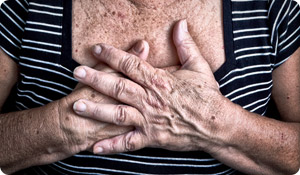
For the most part, there are not many things that mimic acid reflux that are not acid reflux, says Richard A. Desi, M.D. of The Institute for Digestive Health and Liver Disease at Mercy Medical Center in Baltimore. Though heartburn usually is a classic symptom of acid reflux disease, you'll need to see your doctor to determine that's truly the case.
"Sometimes it's tough to sort these things out," says Desi. "That's why an evaluation is required to figure out what's going on." If you experience any symptoms, you need to make an appointment with your doctor to rule out any other causes.
Is It Heartburn or Is It:
A Heart Condition
If you're getting the classic symptoms of heartburn, taking antacid medication will usually bring relief. However, Desi cautions about more alarming symptoms: Numbness radiating down the arm or jaw, pain radiating down the back, or shortness of breath. "You want to make [sure] you don't have any other associated symptoms that would go along with heart problems," he says.
Adding to the issue, some people may not experience symptoms indicating a heart problem. It can be a challenge to distinguish heartburn from heart disease. Medical professionals, just by symptoms alone, can determine the likelihood that somebody is having indigestion, reflux, heartburn, or a heart problem based on their symptoms, but it's not always 100 percent.
Esophageal Spasm
A spasm of the esophagus can cause chest pain. Heartburn is more of a burning sensation, whereas a spasm in the esophagus is more of a sharp pain, Desi explains. You really have to rule out heart problems first, and then see a gastroenterologist or your primary care physician to look into this. Outside of heart disease, most other conditions aren't going to cause major problems—they're just uncomfortable.
Gastroparesis
People with diabetes can experience problems with the gastrointestinal (GI) tract, mainly that the GI tract will slow down over time. The reason: If it takes a while for food to empty, you're more likely to have reflux.
Costochondritis
This inflammation of the cartilage attaches to the rib cage. The irritation around the rib cage can mimic chest pain and a patient may think they have heart burn, says Desi. But it's more of a muscular-skeletal problem and not an internal problem like reflux, heartburn, or a heart condition.
One way to tell the difference? The sharp pain costochondritis causes is usually felt during movement.
Hiatal Hernia
When the stomach protrudes into the hiatus, what connects the esophagus to the stomach, it doesn't typically cause pain or any symptoms for that matter. But some people can experience heartburn or an increase in reflux. It doesn't generally present as a pain in the chest, but it may. That's why it's important to see your doctor. Only your doctor can determine if it's heartburn or a hernia.
Ulcer
This causes more stomach pain, rather than chest pain. Since many patients now take antacid medications, ulcers are not as common, but they certainly still occur. But they cause a gnawing pain in the abdomen, not in the chest. They can get better with food or worse with food, but that usually won't cause chest pain.
Anxiety
Reflux is a normal phenomenon that everyone experiences. We all experience reflux to some degree, assures Desi. Some people with psychological issues (anxiety, stress, depression) have an increased sensitivity or a very low threshold. They have what is called visceral sensitivity, meaning they have an increased awareness of what is happening in their body. That means somebody else may have some mild reflux of the esophagus and not notice it. But if you suffer from anxiety, stress, or depression, you'll feel it.
Acne
It's not exactly a symptom of acne, but the antibiotic doxycycline used to treat acne that can sometimes cause esophageal problems that mimic acid reflux. It can also cause stomach pain since it's very irritating to the stomach, says Desi.
As you can see, heartburn can signal other health problems, and these are just a few of the more common conditions that mimic heartburn. It's important to discuss all your symptoms, as well as medications, with your physician to get to the root of the cause.
Source:
Richard A. Desi, M.D., of The Institute for Digestive Health and Liver Disease at Mercy Medical Center in Baltimore





